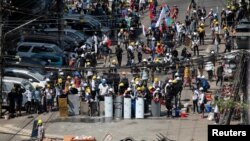Demonstrations against Myanmar’s military junta took place across the country again Thursday in the wake of what the United Nations described as “the bloodiest day” since the February 1 coup.
Reuters says security forces opened fire and hit protesters with tear gas to break up demonstrations in the main city of Yangon and the central town of Monywa.
Protests also took place in Mandalay, where mourners also gathered for the funeral of Kyal Sin, a 19-year-old student who was shot dead Wednesday during demonstrations in that city. Attendees held up pictures of Kyal Sin wearing a t-shirt with the phrase “Everything will be OK” written on the front.
Kyal Sin was one of at least 38 people the United Nations says were killed across Myanmar during Wednesday’s protests, with witnesses saying security forces used live ammunition as well as rubber bullets and tear gas to disperse the crowds. Several people were reportedly injured, among them reporter Htet Aung Khant with VOA’s Burmese Service, who was hit by rubber bullets under his arm as he covered the protests.
“Today, it was the bloodiest day since the coup happened on the first of February,” Christine Schraner Burgener, the U.N. special envoy for Myanmar, told reporters in a video call from Switzerland.
Schraner Burgener said she was very disturbed by videos circulating of police shooting a protester at close range and another of police beating an unarmed medical crew who did not resist arrest.
“From the video clips, I asked some weapons experts to verify to me, it’s not clear, but it seems that the police used weapons like 9-millimeter submachine guns — live ammunition,” she said.
Myanmar has been mired in chaos and violence for one month, since the military’s overthrow of the civilian government and the detentions of de facto leader Aung San Suu Kyi and other high-ranking officials of her National League for Democracy (NLD) Party.
Schraner Burgener said she is in daily contact with Suu Kyi and the committee that represents NLD legislators, known as the CRPH. The envoy last spoke with Deputy Military Chief Soe Win on February 15 but said she sent him a long letter on Sunday. She has not received a direct response but said the military sends her some information every day.
New elections
The military has claimed widespread fraud in last November’s election, which the NLD won in a landslide. Myanmar’s electoral commission has denied the claims.
Military Chief Min Aung Hlaing declared a one-year state of emergency and said new elections will be held to bring about a "true and disciplined democracy.” But he has not said when the vote would be held. Schraner Burgener said Soe Win told her those elections would happen in one year.
“He said that it is due to the constitution,” she said. “We talked also to constitutional experts, and they said it doesn’t have to be one year. But clearly, I think that was the real plan of the army.”
Schraner Burgener expressed concern that the military would conduct sham investigations of the NLD that would lead to their being banned and then the army would illegitimately win the election and stay in power. But she said while this strategy may have worked in the past, it will not work now.
“But today, we have young people who lived in freedom for 10 years. They have social media, and they are well-organized and very determined. They don’t want to go back in a dictatorship and in isolation,” she said. “So, I think the army is surprised, and maybe we have to help them come out of this situation.”
However, Schraner Burgener also said the junta is unconcerned about any response from the international community. When she warned the regime it would face “huge, strong measures” in the form of sanctions, “the answer was, ‘We are used to sanctions and we survived those sanctions in the past,” referring to the military’s previous five-decade rule.
The envoy also said the regime told her, “We have to learn to walk with only a few friends,” when she warned it would face isolation.
Escalation fears
Schraner Burgener said the situation could escalate. She pointed to the declaration by 10 of the 21 armed ethnic groups in Myanmar that they would fight back if the army attacks civilians in their regions.
“If both sides use violence, then we have a situation of a real war in Myanmar, which is in nobody’s interest,” the U.N. envoy said.
She will brief the U.N. Security Council Friday in a closed-door meeting. She last briefed them February 2 at the first and only discussion on the situation.
She told reporters she is still pressing the military to allow her to visit Myanmar, where she has an office and has spent a great deal of time during the three years she has held her mandate.
Myanmar’s UN ambassador
In a separate development, Tin Maung Naing, who was appointed Sunday as Myanmar’s chargé d’affaires at the United Nations by the military regime, has reportedly resigned, according to a post on his Facebook page.
A United Nations spokesperson said they are aware of the reports but had received no official communication.
Ambassador Kyaw Moe Tun was fired by the junta after denouncing the coup at a meeting of the U.N. General Assembly on Friday. He said he is still the ambassador because he was appointed by the democratically elected president.
The matter has now gone to the nine-member U.N. credentials committee for review.




